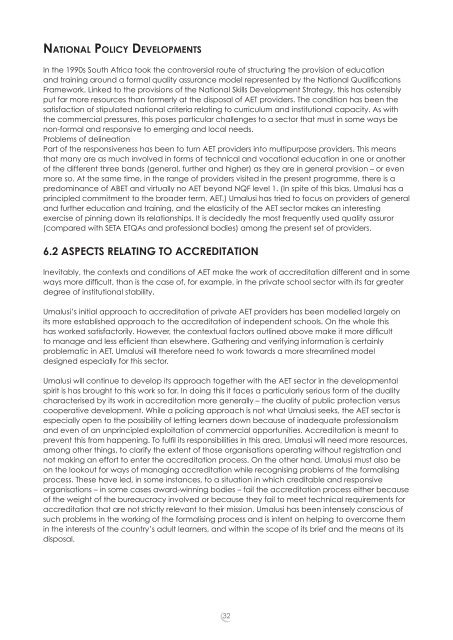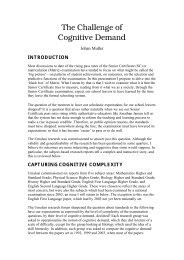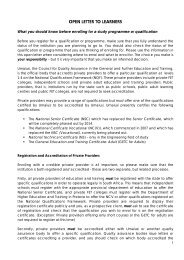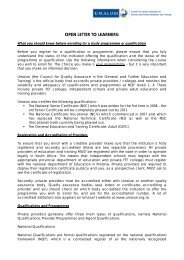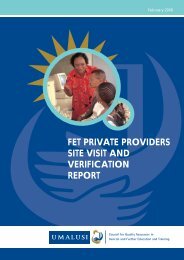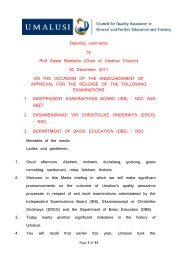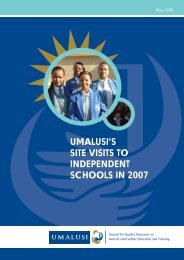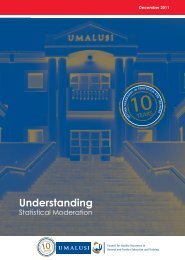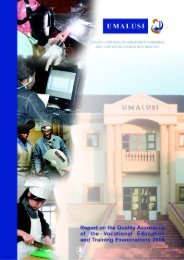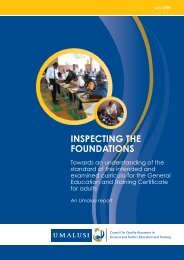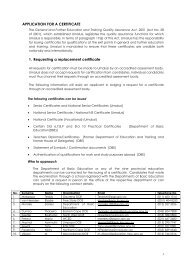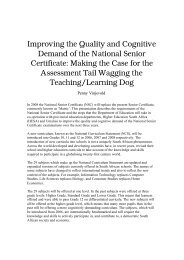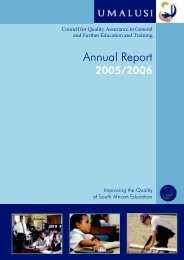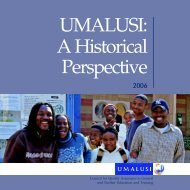Umalusi AET Report
Umalusi AET Report
Umalusi AET Report
- No tags were found...
You also want an ePaper? Increase the reach of your titles
YUMPU automatically turns print PDFs into web optimized ePapers that Google loves.
NATIONAL POLICY DEVELOPMENTSIn the 1990s South Africa took the controversial route of structuring the provision of educationand training around a formal quality assurance model represented by the National Qualifi cationsFramework. Linked to the provisions of the National Skills Development Strategy, this has ostensiblyput far more resources than formerly at the disposal of <strong>AET</strong> providers. The condition has been thesatisfaction of stipulated national criteria relating to curriculum and institutional capacity. As withthe commercial pressures, this poses particular challenges to a sector that must in some ways benon-formal and responsive to emerging and local needs.Problems of delineationPart of the responsiveness has been to turn <strong>AET</strong> providers into multipurpose providers. This meansthat many are as much involved in forms of technical and vocational education in one or anotherof the different three bands (general, further and higher) as they are in general provision – or evenmore so. At the same time, in the range of providers visited in the present programme, there is apredominance of ABET and virtually no <strong>AET</strong> beyond NQF level 1. (In spite of this bias, <strong>Umalusi</strong> has aprincipled commitment to the broader term, <strong>AET</strong>.) <strong>Umalusi</strong> has tried to focus on providers of generaland further education and training, and the elasticity of the <strong>AET</strong> sector makes an interestingexercise of pinning down its relationships. It is decidedly the most frequently used quality assuror(compared with SETA ETQAs and professional bodies) among the present set of providers.6.2 ASPECTS RELATING TO ACCREDITATIONInevitably, the contexts and conditions of <strong>AET</strong> make the work of accreditation different and in someways more diffi cult, than is the case of, for example, in the private school sector with its far greaterdegree of institutional stability.<strong>Umalusi</strong>’s initial approach to accreditation of private <strong>AET</strong> providers has been modelled largely onits more established approach to the accreditation of independent schools. On the whole thishas worked satisfactorily. However, the contextual factors outlined above make it more diffi cultto manage and less effi cient than elsewhere. Gathering and verifying information is certainlyproblematic in <strong>AET</strong>. <strong>Umalusi</strong> will therefore need to work towards a more streamlined modeldesigned especially for this sector.<strong>Umalusi</strong> will continue to develop its approach together with the <strong>AET</strong> sector in the developmentalspirit is has brought to this work so far. In doing this it faces a particularly serious form of the dualitycharacterised by its work in accreditation more generally – the duality of public protection versuscooperative development. While a policing approach is not what <strong>Umalusi</strong> seeks, the <strong>AET</strong> sector isespecially open to the possibility of letting learners down because of inadequate professionalismand even of an unprincipled exploitation of commercial opportunities. Accreditation is meant toprevent this from happening. To fulfi l its responsibilities in this area, <strong>Umalusi</strong> will need more resources,among other things, to clarify the extent of those organisations operating without registration andnot making an effort to enter the accreditation process. On the other hand, <strong>Umalusi</strong> must also beon the lookout for ways of managing accreditation while recognising problems of the formalisingprocess. These have led, in some instances, to a situation in which creditable and responsiveorganisations – in some cases award-winning bodies – fail the accreditation process either becauseof the weight of the bureaucracy involved or because they fail to meet technical requirements foraccreditation that are not strictly relevant to their mission. <strong>Umalusi</strong> has been intensely conscious ofsuch problems in the working of the formalising process and is intent on helping to overcome themin the interests of the country’s adult learners, and within the scope of its brief and the means at itsdisposal.32


